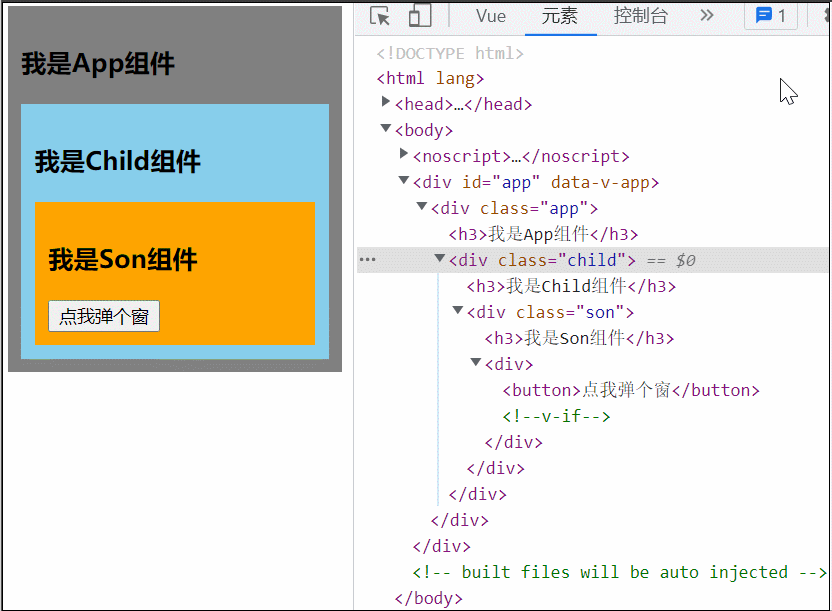vue3 teleport 组件,怎么把 它传送到最前面
<teleport to="body">
<ChildrenVue /> # position:absolute
</teleport>
这个默认是插 body最后面,
这样可能造成了ChildrenVue 不可见,有没有什么简便的办法 ,把 ChildrenVue 成为body的 firstchild
TechWhizKid参考GPT回答:
Teleport 组件在 Vue 3 中默认会将组件传送到指定位置的末尾,因此直接用 Teleport 组件无法实现将组件传送到 body 的最前面。
- 一种可能的解决方案是,在
body标签内预先创建一个用于接收Teleport组件的占位元素,如一个div,并将这个div设为body的第一个子元素。然后,你可以将to属性设置为该div的选择器,这样Teleport组件就会将其内容传送到body的最前面。
例如:
HTML:
<body>
<div id="teleport-target"></div>
...
</body>
Vue:
<teleport to="#teleport-target">
<ChildrenVue /> <!-- position:absolute -->
</teleport>
如果你真的要直接将元素传送到 body 的最前面,你可能要用 JavaScript 进行额外的操作,例如在页面加载时动态创建一个接收 Teleport 的 div 并将其设为 body 的第一个子元素。
以下是一个示例:
mounted() {
const target = document.createElement('div');
document.body.insertBefore(target, document.body.firstChild);
this.targetId = target.id = 'teleport-target-' + this._uid;
},
beforeUnmount() {
const target = document.getElementById(this.targetId);
if (target) {
document.body.removeChild(target);
}
}
然后在模板中使用这个动态创建的 div 的 ID:
<teleport :to="`#${targetId}`">
<ChildrenVue /> <!-- position:absolute -->
</teleport>
这种方法会在页面加载时修改 DOM,可能会影响页面的性能。
有帮助的话 采纳一下
你可以使用在 teleport 组件中使用 insert 属性,将 ChildrenVue 插入到 body 的第一个子元素:
<teleport to="body" insert="first-child">
<ChildrenVue />
</teleport>
insert 有以下可选值:
- 'first-child' - 将内容插入到目标元素的第一个子元素前面。
- 'last-child' - 将内容插入到目标元素的最后一个子元素后面。
- 'before' - 将内容插入到目标元素之前。
- 'after' - 将内容插入到目标元素之后。
所以使用 insert="first-child" 就可以将 ChildrenVue 插入到 body 的第一个子元素前,成为第一个子元素。
另外,你也可以在 teleported 组件中使用 target 属性指定一个更精确的插入位置:
<div id="insertion-point"></div>
<teleport to="body" target="#insertion-point">
<ChildrenVue />
</teleport>
这会将 ChildrenVue 插入到 body 中 id 为 insertion-point 的元素内。
所以以上两种方法,可以很方便地控制 teleport 到达的内容插入到正确的位置。
可以使用 appendChild 方法将 ChildrenVue 添加到 body 中,并确保它是第一个子节点。具体方法如下:
<template>
<teleport to="body">
<div ref="childrenVueRef">
<ChildrenVue />
</div>
</teleport>
</template>
<script>
import ChildrenVue from './ChildrenVue.vue';
export default {
components: {
ChildrenVue,
},
mounted() {
const childrenVueElement = this.$refs.childrenVueRef.$el;
const bodyElement = document.body;
// 将 childrenVueElement 插入到 body 中
if (bodyElement.firstChild) {
bodyElement.insertBefore(childrenVueElement, bodyElement.firstChild);
} else {
bodyElement.appendChild(childrenVueElement);
}
},
};
</script>
在这个例子中,我们给 ChildrenVue 组件包裹了一层 div 元素,并通过 ref 属性引用它。在组件挂载时,我们获取到 ChildrenVue 元素节点,并通过 insertBefore 方法将它插入到 body 中的第一个位置。如果 body 中没有子节点,我们就使用 appendChild 方法将其附加到 body 中。
通过这种方法,您就可以将 ChildrenVue 组件插入到 body 中并使其成为第一个子节点。
<template>
<teleport to="body">
<div ref="teleportTarget"></div> <!-- 新增一个占位元素 -->
<ChildrenVue />
</teleport>
</template>
<script>
import ChildrenVue from './ChildrenVue.vue';
export default {
components: {
ChildrenVue,
},
mounted() {
// 将ChildrenVue移动到teleportTarget之后
const teleportTarget = this.$refs.teleportTarget;
const childrenVue = document.querySelector('#children-vue');
teleportTarget.parentNode.insertBefore(childrenVue, teleportTarget.nextSibling);
},
};
</script>
可以通过 JavaScript 来实现将 ChildrenVue 成为 body 的第一个子元素。代码如下:
const body = document.querySelector('body');
const childrenVue = document.querySelector('.ChildrenVue');
body.insertBefore(childrenVue, body.firstChild);
这段代码根据 querySelector 方法的选择器选择出 body 和 ChildrenVue 元素,然后使用 insertBefore 方法将 ChildrenVue 插入到 body 的第一个子元素位置。
需要注意的是,如果在 teleport 中使用了 position: absolute,则需要确保 ChildrenVue 元素的位置信息已被计算出来并正确设置。否则即使将其插入到 body 的第一个子元素位置,也可能无法正确显示。
要将 组件成为 组件的第一个子元素,可以在 ChildrenVue 组件中使用 :key 属性来指定一个唯一的标识符,然后将它作为第一个子元素。
例如:
<teleport to="body">
<ChildrenVue :key="1" />
<h1>这是第二个子元素</h1>
</teleport>
这样就可以将 组件作为 组件的第一个子元素,并且第二个子元素是 < h1 > 标签。
- 帮你找了个相似的问题, 你可以看下: https://ask.csdn.net/questions/7752683
- 你也可以参考下这篇文章:Vue 的 teleport(传送 / 传送门)组件
- 除此之外, 这篇博客: Vue3 新的组件中的 teleport组件 部分也许能够解决你的问题, 你可以仔细阅读以下内容或跳转源博客中阅读:
Teleport 是一种能够将我们的组件 html 结构移动到指定位置的技术
<teleport to="移动位置"> <div v-if="isShow" class="mask"> <div class="dialog"> <h3>我是一个弹窗</h3> <button @click="isShow = false">关闭弹窗</button> </div> </div> </teleport>我们先做这样一个效果

App.vue
<template> <div class="app"> <h3>我是App组件</h3> <Child/> </div> </template> <script> import Child from "@/components/Child"; export default { name: 'App', components: {Child} } </script> <style> .app { background-color: gray; padding: 10px; } </style>Child.vue
<template> <div class="child"> <h3>我是Child组件</h3> <Son/> </div> </template> <script> import Son from "@/components/Son"; export default { name: 'Child', components: { Son } } </script> <style> .child { background-color: skyblue; padding: 10px; } </style>Son.vue
<template> <div class="son"> <h3>我是Son组件</h3> <Dialog/> </div> </template> <script> import Dialog from "@/components/Dialog"; export default { name: 'Son', components: { Dialog } } </script> <style> .son { background-color: orange; padding: 10px; } </style>Dialog.vue
<template> <div> <button @click="isShow = true">点我弹个窗</button> <div class="dialog" v-if="isShow"> <h3>我是弹框</h3> <button @click="isShow = false">关闭弹框</button> </div> </div> </template> <script> import {ref} from 'vue' export default { name: 'Dialog', setup() { let isShow = ref(false) return {isShow} } } </script> <style> .dialog { width: 100px; height: 100px; background-color: green; } </style>可以看到当 Son 中的 Dialog 展开时,所有父组件都被撑开了,我们可以用 teleport 将弹框移动到 body 里,展示到屏幕中间

<template> <div> <button @click="isShow = true">点我弹个窗</button> <teleport to="body"> <div class="mask" v-if="isShow"> <div class="dialog" v-if="isShow"> <h3>我是弹框</h3> <button @click="isShow = false">关闭弹框</button> </div> </div> </teleport> </div> </template> <script> import {ref} from 'vue' export default { name: 'Dialog', setup() { let isShow = ref(false) return {isShow} } } </script> <style> .dialog { position: absolute; left: 50%; top: 50%; transform: translate(-50%,-50%); text-align: center; width: 100px; height: 100px; background-color: green; } .mask { position: absolute; top: 0; bottom: 0; left: 0; right: 0; background-color: rgb(0, 0, 0, 0.5); } </style>
基于new bing部分指引作答:
在Vue 3中,teleport组件是用于将内容传送(teleport)到DOM中的指定位置的。默认情况下,teleport会将内容添加到目标位置的最后面,但你可以使用CSS来控制其位置。要将ChildrenVue组件传送到body的第一个子元素位置,你可以使用以下方法:
<teleport to="body">
<ChildrenVue style="position: absolute; top: 0; left: 0;" />
</teleport>
在上述代码中,我们给ChildrenVue组件添加了style属性,设置了其位置为绝对定位,并将top和left属性设置为0,这将使它定位在body的左上角,成为其第一个子元素。
请注意,你可能还需要根据需要调整z-index属性,以确保ChildrenVue位于其他元素之前。
希望这可以帮助到你!
可以使用Vue的v-if指令将ChildrenVue进行条件渲染,在body中作为第一个子节点插入。示例代码如下:
<body>
<div id="app"></div>
<script>
const app = Vue.createApp({
data() {
return {
showChildren: true // 判断是否显示 ChildrenVue
}
},
components: {
ChildrenVue: {
template: `
<div style="position: absolute; top: 0; left: 0;">ChildrenVue</div>
`
}
}
})
app.mount('#app')
</script>
<script>
document.addEventListener('DOMContentLoaded', function () {
const el = document.createElement('div')
el.id = 'portal'
document.body.insertBefore(el, document.body.firstChild)
const app = Vue.createApp({
template: `
<teleport to="#portal">
<ChildrenVue v-if="showChildren"/>
</teleport>
`,
data() {
return {
showChildren: false // 初始不显示 ChildrenVue
}
}
})
app.mount('#app')
setTimeout(() => {
app.showChildren = true // 显示 ChildrenVue
}, 0)
})
</script>
</body>
需要注意的是,teleport指令可以指定一个CSS选择器或DOM元素作为目标容器,所以我们可以使用一个空的div来作为目标容器,在body中作为第一个子节点插入。另外,由于v-if指令是根据showChildren的值决定是否渲染ChildrenVue组件,因此需要在setTimeout中将showChildren设置为true,以确保ChildrenVue会被渲染并插入到body中。
使用插槽传递
在你想要将组件挂载到的元素外面包一个具有固定位置(position: fixed 或者 position: absolute)的父元素,以便在DOM树上最外层。将该元素的id属性设置为app,
<div id="app">
<div class="fixed-container">
<teleport to="body">
<ChildrenVue />
</teleport>
</div>
</div>
可以看到,现在被包含在一个拥有position: fixed的父元素中,并且这个父元素又包含在id属性为 app的元素中。
源于chatGPT仅供参考
在Vue 3的Teleport组件中,默认情况下,被传送的内容会插入到目标位置的最后面。如果你希望将ChildrenVue成为body的第一个子元素,你可以使用Vue中的`v-if`指令结合动态渲染的方式来实现。
首先,你可以创建一个名为`isMounted`的响应式变量,用于控制是否渲染`ChildrenVue`组件。然后,在`teleport`的`to`属性中使用`v-if`指令来判断是否要渲染它。当`isMounted`为`true`时,即可将`ChildrenVue`插入到body的第一个子元素位置。
以下是示例代码:
```vue
<template>
<div>
<!-- 这里放其他的内容 -->
<teleport to="body" v-if="isMounted">
<ChildrenVue /> <!-- position:absolute -->
</teleport>
</div>
</template>
<script>
import ChildrenVue from './ChildrenVue.vue';
export default {
components: {
ChildrenVue,
},
data() {
return {
isMounted: false,
};
},
mounted() {
this.isMounted = true;
},
};
</script>
在上述代码中,isMounted初始值为false,当组件挂载完成后,mounted钩子函数会将其设置为true,这样就会触发ChildrenVue的渲染,并将其作为body的第一个子元素插入。
通过这种方法,你可以在需要的时候将ChildrenVue组件传送到body的第一个子元素位置。
```
你用mounted 钩子函数就可以了:
mounted() {
const teleportTarget = document.querySelector('#teleport-target')
const bodyFirstChild = document.body.firstChild
if (teleportTarget && bodyFirstChild) {
document.body.insertBefore(teleportTarget, bodyFirstChild)
}
}
你要将 teleport 组件的目标元素添加一个唯一的 id,比如 id="teleport-target",方便在
代码中选择。
Teleport to ="body" 默认是将元素放在body节点的最后一个节点的位置,如果你希望放在body下的元素的第一个位置的话,那么你可以通过css来实现自自定义传送位置, 支持 class id等 选择器。
可以使用 CSS 的 position: fixed 属性来实现
<teleport to="body">
<ChildrenVue />
</teleport>
const teleport = document.querySelector('teleport');
const childrenVue = document.querySelector('ChildrenVue');
const body = document.querySelector('body');
// 将 ChildrenVue 插入到 body 的开头
body.insertBefore(childrenVue, body.firstChild);